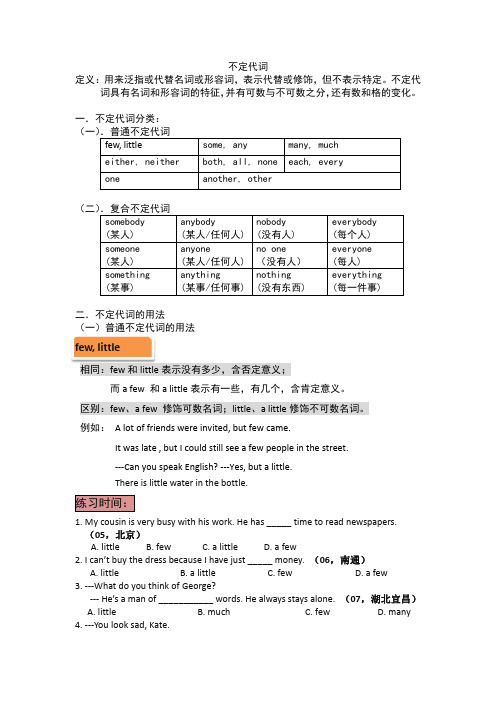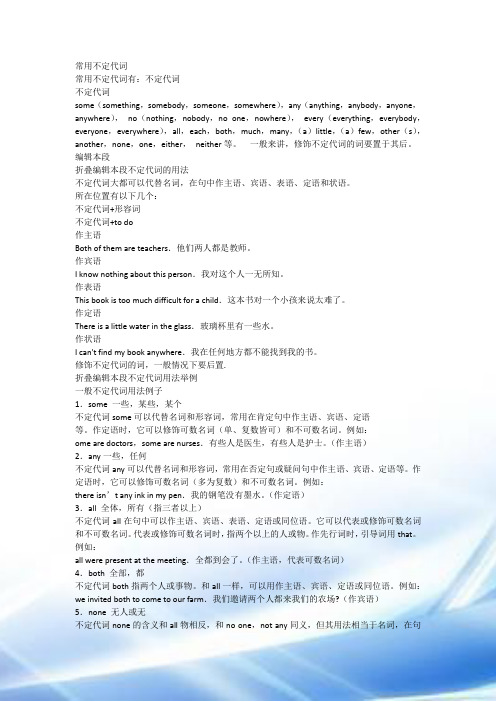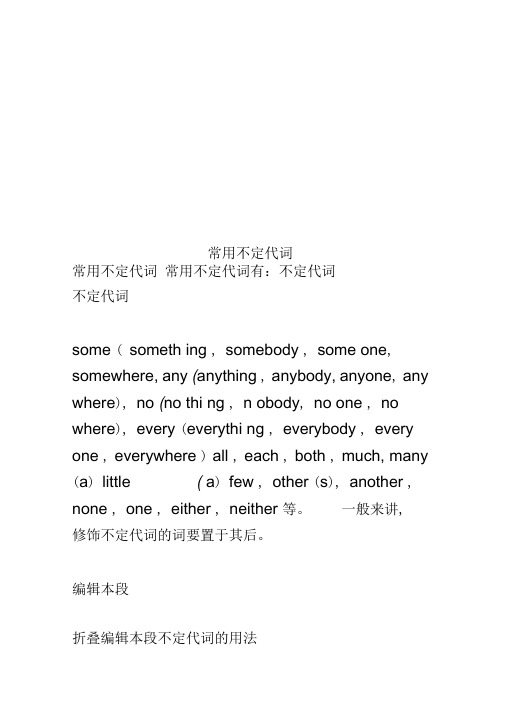不定代词
不定代词的分类和用法

不定代词的分类和用法不定代词是一类特殊的代词,用来指代不确定的人或物,或者表示泛指、替代和数量的概念。
在英语语法中,不定代词有多种分类和用法。
在本文中,我们将详细介绍不定代词的分类和用法。
一、不定代词的分类1. Indefinite pronouns (不定代词)A. Affirmative Indefinite Pronouns (肯定型不定代词)1) Singular Indefinite Pronouns (单数肯定型不定代词): everybody, everybody, everything, each, everybody, someone, somebody, no one, anything, nobody, somebody, anyone, anything2) Plural Indefinite Pronouns (复数肯定型不定代词): both, several, many, few, many, others, othersB. Negative Indefinite Pronouns (否定型不定代词)1) Singular Indefinite Pronouns (单数否定型不定代词): nobody, nothing, neither, none, no one, nothing2) Plural Indefinite Pronouns (复数否定型不定代词): none, neither, no oneC. Interrogative Indefinite Pronouns (疑问型不定代词): anybody, anyone, anything, somebody, someone, somethingD. Universal Indefinite Pronouns (全称型不定代词): all, both, each, every, any, either, neitherE. Distributive Indefinite Pronouns (分配型不定代词): each, every, either, neither二、不定代词的用法1. 泛指不定代词 (General Indefinite Pronouns)这类不定代词用于泛指不确定对象,表示一个人或事物。
不定代词

不定代词定义:用来泛指或代替名词或形容词,表示代替或修饰,但不表示特定。
不定代词具有名词和形容词的特征,并有可数与不可数之分,还有数和格的变化。
一.不定代词分类:二.不定代词的用法(一)普通不定代词的用法而a few 和a little表示有一些,有几个,含肯定意义。
区别:few、a few 修饰可数名词;little、a little修饰不可数名词。
例如:A lot of friends were invited, but few came.It was late , but I could still see a few people in the street.---Can you speak English? ---Yes, but a little.There is little water in the bottle.1. My cousin is very busy with his work. He has _____ time to read newspapers.(05,北京)A. littleB. fewC. a littleD. a few2. I can’t buy the dress because I have just _____ money. (06,南通)A. littleB. a littleC. fewD. a few3. ---What do you think of George?--- He’s a man of ___________ words. He always stays alone.(07,湖北宜昌)A. littleB. muchC. fewD. many4. ---You look sad, Kate.---Yeah. I have made _______ mistakes in my report. (07,武汉)A. a littleB. littleC. a fewD. few5. ____ children there are in a family, ____ their life will be.(07,陕西工大附中)A. The less, the betterB. The fewer, the betterC. Fewer, richerD. More, poorer例:He has some Chinese paintings.Ask me if you have any questions.Do you have any questions to ask?I don’t know any of the students.3.特殊用法:some 用于疑问句,表示希望对方得到肯定回答的疑问句里any用于肯定句,表示“任何”例:Would you like some bananas?(邀请)Mum, could you give me some money? (请求)You may take any of them.1.There isn’t ________ water in the glass. Let’s go and get some.(08,北京朝阳)A. manyB. lotsC. anyD. some2. I asked her for _________ milk, but she didn’t have ________ .(08,茂名)A. any; someB. some; anyC. some; some3. ______ police officers in the UK carry guns, but most of them don't.(08,徐州)A. NoB. SomeC.ManyD. All4. There is_____ salt in the kitchen. Would you like to go to the store and get ____? (镇江市)A.little, some B. little, any C. a little, some D. a little, any相同:many和much都表示“许多”不同:①many修饰或代替复数可数名词,much修饰或代替不可数名词。
不定代词的种类及用法总结

不定代词的种类及用法总结不定代词是指代词的一种,其特点是可以泛指一类事物或代替没有具体确定的名词。
不定代词的使用可以使文章更加简洁明了,避免重复使用具体名词。
本文将总结不定代词的种类及其常见的用法。
一、不定代词的种类不定代词根据其用途和功能可分为以下几类:1. 物质不定代词:something(某物)、anything(任何事物)、everything(每件事物)、nothing(没有事物)2. 人称不定代词:someone(某人)、anyone(任何人)、everyone(每个人)、no one(没有人)3. 形容词不定代词:some(一些)、any(一些)、many(许多)、few(少数)、several(几个)、all(所有的)4. 代词不定代词:somebody(某人)、anybody(任何人)、everybody(每个人)、nobody(没有人)5. 特殊不定代词:each(每个)、either(任何一个)、neither(两者都不)、both(两者都)二、不定代词的用法1. 泛指不定代词:不定代词可以用来泛指一类事物,如:something、anything、everything、nothing。
它们在句子中作主语、宾语或表语时,能够表示泛指、不确定或无所指的意义。
例如:- Something is wrong with the computer.(电脑出了问题。
)- I don't want to buy anything today.(我今天不想买任何东西。
)- She knows everything about fashion.(她对时尚了如指掌。
)- There is nothing better than a good book.(没有什么比一本好书更好了。
)2. 人称不定代词:人称不定代词用来泛指某个人,如:someone、anyone、everyone、no one。
不定代词的种类及用法

不定代词的种类及用法不定代词是指在句子中代替某一种特定的名词,但没有具体指向的代词。
不定代词可以起到简化语言表达、避免重复使用名词的作用,使句子更加简洁明了。
本文将介绍不定代词的种类及其常见的用法。
一、不定代词的种类1. 一些 (some)不定代词“一些”用来表示某个范围内的不确定数量或程度,可以用来修饰可数名词和不可数名词。
例如:- 我需要一些帮助。
(I need some help.)- 请给我一些水。
(Please give me some water.)2. 许多 (many)不定代词“许多”表示大量或许多的事物,多用来修饰可数名词。
例如:- 我认识许多人。
(I know many people.)- 我们有许多共同之处。
(We have many things in common.)3. 几个 (several)不定代词“几个”表示不确定的数量,多用来修饰可数名词。
例如:- 我买了几个苹果。
(I bought several apples.)- 几个人正在等你。
(Several people are waiting for you.)4. 更多 (more)不定代词“更多”表示数量或程度的增加,常用来修饰可数名词和不可数名词。
例如:- 我还想要更多的时间。
(I need more time.)- 这个城市有更多的机会。
(The city has more opportunities.)5. 少数 (few)不定代词“少数”表示数量或程度的减少,多用来修饰可数名词。
例如:- 只有少数人通过了考试。
(Only a few people passed the exam.)- 在这个时期,几乎没有少数人敢表达自己的观点。
(During this period, few people dare to express their opinions.)二、不定代词的用法1. 主语不定代词可以作为句子的主语,它们通常单独成句,例子如下:- 有人在敲门。
常用不定代词有

常用不定代词有:some(something,somebody,someone),any(anything,anybody,anyone),no(nothing,nobody,no one),every(everything,everybody,everyone,),all,each,both,much,many,(a)little,(a)few,other(s),another,none,one,either,neither等。
一般来讲,修饰不定代词的词要置于其后。
一、不定代词的用法不定代词大都可以代替名词和形容词,在句中作主语、宾语、表语和定语。
1.作主语Both of them are teachers.他们两人都是教师。
2.作宾语I know nothing about this person.我对这个人一无所知。
3.作表语This book is too difficult for a child.这本书对一个小孩来说太难了。
4.作定语There is a little water in the glass.玻璃杯里有一些水。
修饰不定代词的词,一般情况下要后置二、常用不定代词用法举例一般不定代词用法例子1.some一些,某些,某个不定代词some可以代替名词和形容词,常用在肯定句中作主语、宾语、定语等。
作定语时,它可以修饰可数名词(单、复数皆可)和不可数名词。
例如:some are doctors,some are nurses.有些人是医生,有些人是护士。
(作主语)2.any一些,任何不定代词any可以代替名词和形容词,常用在否定句或疑问句中作主语、宾语、定语等。
作定语时,它可以修饰可数名词(多为复数)和不可数名词。
例如:there isn’t any ink in my pen.我的钢笔没有墨水。
(作定语)不定代词any有时也可以用在肯定句中,表示"任何的"。
例如:you may come at any time;i’ll be home the whole day.你任何时候来都行,我整天都将呆在家里。
不定代词

You can do it in class. You can also do it at home. (保持原意) You can do it _______ in class ______ at home. either or Cathy hasn’t been to China. Nor has Jenny. (保持原意) Neither Cathy _____Jenny _____ been to China. nor has ______
1.Be quiet, boys and girls . I have ____
to tell you.
A. important something
B. something important
C. anything important
D. important anything
考点二:谓语动词的单复数
连线
1.It’s too heavy to carry. 2.Can I have some breakfast? 3.I’m hungry. 4.Who can solve this problem? 5.Is someone near us? A.No.There’s nobody there. B.Let’s get something to eat. C.No,you can’t eat anything. D.Please ask somebody to help us. E.I believe everybody can.
6. Liu Xiang and Yao Ming are worldfamous sports stars. Both of them ____ set a good example to us. C A. has B. are C. have D. is
不定代词

第一部分:语法---不定代词常用的不定代词有:some(某个,某些), any(任何一个,一些), no(没有),none(没有人或物), many(许多), much(许多), a few(一些), few(很少, 几乎没有), alittle(一些), little(很少, 几乎没有),each(每个), every(每个), one(一个), both(两者都), all(所有的), either(二者之一), neither(两者都不), other(别的,其他), another(另一个), 还有由some, any, no, every 开头构成的复合不定代词, 如:someone,anybody, everything, no one 等。
1. 常用来修饰可数名词复数的不定代词有many, a few, few, both, either, neither ;常用来修饰不可数名词的有much, a little, little ;可数与不可数两者都可修饰的有some, any ,如:He has already made a few friends in China.Would you give me a little paper?2. Some, something, somewhere, everything, everywhere 常用于肯定句,any,anything, anywhere 常用于疑问句和否定句;none, nothing, nowhere 常用于否定句且本身表否定,如:I’m looking for my watch everywhere but I don’t find it anywhere .I have some water but I have not any tea.注意:当说话者希望得到肯定回答时,some 和some 的复合代词也可用于疑问句中,如:Would you like something to eat?Could you please give me some help?3. 由some, any, no, every 开头构成的复合不定代词,做主语时,谓语要用第三人称单数。
常用不定代词

3. something可用于提建议或请求的问句中,以及希望说话对方作出肯定回答的问句中。如:
Would you like something to eat?你要吃点东西吗?
4.复合不定代词在句子中作主语时,谓语动词一般用单数形式。如:
Nobody knows his name.没有人知道他的名字。
编辑本段
折叠编辑本段不定代词的用法
不定代词大都可以代替名词,在句中作主语、宾语、表语、定语和状语。
所在位置有以下几个:
不定代词+形容词
不定代词+to do
作主语
Both of them are teachers.他们两人都是教师。
作宾语
I know nothing about this person.我对这个人一无所知。
作表语
This book is too much difficult for a child.这本书对一个小孩来说太难了。
作定语
There is a little water in the glass.玻璃杯里有一些水。
作状语
I can't find my book anywhere.我在任何地方都不能找到我的。
5.none无人或无
不定代词none的含义和all物相反,和no one,not any同义,但其用法相当于名词,在句子中一般作主语或宾语。它代替不可数名词作主语时,谓语动词用单数形式;代替可数名词作主语时,谓语动词用单、复数皆可。例如:
one of the problems is /are easy to solve.这些问题没有一个是容易解决的。(作主语,代替可数名词)
either is interesting.两个都没有趣。(作主语)
不定代词总结归纳

不定代词总结归纳不定代词是指在句子中代替不确定具体指向的名词的一类词语。
它们可以用来指代人或事物,丰富了句子的表达方式。
在英语中,不定代词有多种类型,包括不定代词的数量少、一些和未定代词等。
本文将对常见的不定代词进行总结归纳,以帮助读者更好地理解和运用不定代词。
1. 不定代词的数量少不定代词的数量少指代表不确定数量的不定代词,包括some, any,no和their等。
1.1 some"some"表示肯定的或询问的不确定数量,常用于肯定句和疑问句中。
例如:- I have some friends.(我有一些朋友。
)- Could you pass me some water?(你能给我递一些水吗?)1.2 any"any"表示否定的或疑问的不确定数量,常用于否定句和疑问句中。
例如:- I don't have any money.(我没有钱。
)- Do you have any plans for the weekend?(你周末有什么计划吗?)1.3 no"no"表示零个或否定的数量,常用于否定句和问句中。
例如:- There is no milk in the fridge.(冰箱里没有牛奶。
)- Did you see no one else in the room?(你看到房间里没有别人吗?)1.4 their"their"表示"他们/她们/它们的",常用于指代复数名词的所有格。
例如:- The students are studying for their exams.(学生们正在为他们的考试而学习。
)2. 一些一些不定代词用于表示某个不确定数量的人或物,包括:somebody/someone, anybody/anyone和nobody/no one等。
2.1 somebody/someone"somebody"和"someone"表示"某人",用于肯定句中。
常用不定代词

常用不定代词常用不定代词常用不定代词有:不定代词不定代词some ( someth ing , somebody , some one, somewhere, any (anything , anybody, anyone, any where), no (no thi ng , n obody, no one , no where), every (everythi ng , everybody , every one , everywhere ) all , each , both , much, many (a) little ( a) few , other (s), another , none , one , either , neither 等。
一般来讲,修饰不定代词的词要置于其后。
编辑本段折叠编辑本段不定代词的用法不定代词大都可以代替名词,在句中作主语、宾语、表语、定语和状语。
所在位置有以下几个:不定代词+形容词不定代词+to do作主语Both of them are teachers •他们两人都是教师。
作宾语I know nothing about this pers on •我对这个人一无所知。
作表语This book is too much difficult for achild •这本书对一个小孩来说太难了。
作定语There is a little water in the glass .玻璃杯里有一些水。
作状语I can't find my book any where .我在任何地方都不能找到我的书。
修饰不定代词的词,一般情况下要后置•折叠编辑本段不定代词用法举例一般不定代词用法例子1. some 一些,某些,某个不定代词some可以代替名词和形容词,常用在肯定句中作主语、宾语、定语等。
作定语时,它可以修饰可数名词(单、复数皆可)和不可数名词。
例如:ome are doctors , some are nurses .有些人是医生,有些人是护士。
不定代词

不定代词基本用法1. 不定代词大都可以在句中作主语、宾语、表语、定语,起着名词和形容词的作用。
例如:Both of them are doctors. 他们两人都是医生。
(作主语)I saw nothing in the box. 我看到盒子里什么也没有。
(作宾语)It is something strange. 那是很奇怪的事情。
(作表语)There is a little juice in the glass. 玻璃杯里有一些果汁。
(作定语)Could you come a little earlier? (不同提法,a little可以理解为相当于副词作状语)2. 如果主语是不定代词some-(something,somebody,someone),any-(anything,anybody,anyone),No-(nothing,nobody,no one),every-(everything,everybody,everyone-),a (little), less, , much, one,another,nobody, nothing, neither, each,either 等时,谓语动词用单数形式。
例如:There is little water in the glass. Please bring me more. 杯子里没有水了,请再给我取点。
Nobody is ready to help me. 没有人准备帮我。
3. 如果主语是several,both, many,(a)few,others 等时谓语动词用复数。
例如:Both of them are doctors. 他们两个都是医生。
4. 如果主语是all, none, some, any, such, more, most等时谓语动词用单数或复数要根据实际情况而定。
例如:All the books are mine. 所有这些书都是我的。
英语语法 什么是不定代词

英语语法什么是不定代词英语语法不定代词是指用来替代特定或具体名词的代词,但不指代具体的人、事、物或数量的词语。
不定代词通常用于表示不确定、泛指或不特定的情况。
在英语中,有许多不定代词用于替代特定的名词,每个不定代词都有自己的语法规则和用法。
以下是一些常见的不定代词及其用法的详细解释。
1. Some/Any- Some用于肯定句中,表示某个或一些。
- Any用于否定句和疑问句中,表示任何或一些。
例句:- I have some books on the shelf.(我书架上有一些书。
)- I don't have any apples.(我没有任何苹果。
)- Do you have any questions?(你有任何问题吗?)2. All/None/Both- All表示全部或所有。
- None表示没有任何。
- Both表示两个都。
例句:- All students must attend the meeting.(所有学生都必须参加会议。
)- None of the food is left.(没有任何食物剩下了。
)- Both options are good.(两个选项都不错。
)3. Each/Every- Each表示每一个,强调个体。
- Every表示每一个,强调整体。
例句:- Each student should bring their own pen.(每个学生都应该带自己的笔。
)- Every student must pass the exam.(每个学生都必须通过考试。
)4. Somebody/Anybody/Nobody/Everybody- Somebody表示某人。
- Anybody表示任何人。
- Nobody表示没有任何人。
- Everybody表示每个人。
例句:- Somebody called you earlier.(有人给你打电话了。
)- Did anybody see what happened?(有人看到发生了什么吗?)- Nobody knows the answer.(没有人知道答案。
不定代词

返回 | 分享 | 收藏不用冠词的情况1、国名,人名前通常不用冠词。
如:England英国 Mary玛丽2、名词前有this, that, my, your, whose, some, any, no, each, every等词时,不用冠词。
如:Thisis my hat. 这是我的帽子。
3、在表示交通工具、学科名称的名词前不加冠词。
如:by plane by boat onfootChinese4、在季节、月份、节日、假日、日期、星期等表示时间的名词之前,一般不用冠词。
如:Springis coming. 春天要来了。
Wego to school from Monday to Friday. 我们从星期一到星期五都上课。
5、在三餐、球类运动和娱乐运动的名称前,不加冠词。
如:have breakfast吃早饭 playchess玩象棋6、在一些固定词组中不加冠词。
冠词是一种虚词,不能独立使用,通常放在名词的前面,分为“不定冠词”和“定冠词”两种。
1、不定冠词:a、an。
用在单数名词前,表示“一个,一件……”。
an用在以元音“音素”开头的单词前。
如:an e-mail, an orange, anold man, an English watch, an hour…2、定冠词:the。
用在单数或者复数名词前。
the没有具体意思,有时翻译为这、那。
它的基本用法:(1)用来表示特指某(些)人或某(些)事物。
如:The map on the wall isnew.(2)表示说话者双方都知道的人或事物。
如:Look at the picture,please.(3)表示再次提到前面谈过的人或事物。
如:This is a stamp. The stampis beautif ul.(4)用在表示世界上独一无二的事物前。
如:the sun太阳the moon月亮the ear th地球(5)用在由普通名词构成的专有名词前。
不定代词(常见普通不定代词)

整理ppt
3、all,any与none
相同点
都用于三个或三个以上的人或物
不同点
all any none
指“三个或三个以上的人或 物”。作主语时,谓语用复数。 反义词是none
指“三个或三个以上的人或物 中的一个”
指“三个或三个以上的人或物 中没有一个”,相当于not any.
整理ppt
不定代词
不定代词分为普通不定代词和复合不定代词。 常见的普通不定代词:
some any both either neither all any none few a few little a little many much
整理ppt
1、some和any
相同点
都可修饰可数名词和不可数名词, 表示“一些”
不同点
some any
一般用于肯定句中,也可 用于建议或请求的疑问句 中,表示说话人希望得到 肯定的回答
多用于疑问句、否定句中
Hale Waihona Puke 整理ppt2、both,either与neither
相同点 都用于两个人或物
不同点
both 指“两者都”。作主语时,谓语 动词用复数
either 指“两者中的任意一个”,作主 语时,谓语动词用单数
初中英语8个不定代词

初中英语8个不定代词
不定代词通常指的是一类用于替代不确定或泛指人或事物的词汇。
1 Somebody / Someone:
用法:指代不特定的人。
例句:Somebody is waiting for you at the door.
2 Something:
用法:指代不特定的事物。
例句:I heard something strange in the backyard.
3 Anybody / Anyone:
用法:用于疑问句或否定句,指代任何一个人。
例句:Has anyone seen my keys?
4 Anything:
用法:指代任何事物。
例句:You can ask me anything you want.
5 Everybody / Everyone:
用法:指代所有人,强调每个人。
例句:Everyone is invited to the party.
6 Everything:
用法:指代所有事物,强调每件事物。
例句:She has to finish everything before leaving.
7 Nobody / No one:
用法:指代没有任何人。
例句:Nobody knows the answer to that question.
8 Nothing:
用法:指代没有任何事物。
例句:There is nothing in the fridge.。
常用不定代词

常用不定代词常用不定代词常用不定代词有:不定代词不定代词some(something,somebody,someone,somewhere),any(anything,anybody,anyone,anywhere), no(nothing,nobody,no one,nowhere), every(everything,everybody,everyone,everywhere),all,each,both,much,many,(a)little,(a)few,other(s),another,none,one,either, neither等。
一般来讲,修饰不定代词的词要置于其后。
编辑本段折叠编辑本段不定代词的用法不定代词大都可以代替名词,在句中作主语、宾语、表语、定语和状语。
所在位置有以下几个:不定代词+形容词不定代词+to do作主语Both of them are teachers.他们两人都是教师。
作宾语I know nothing about this person.我对这个人一无所知。
作表语This book is too much difficult for a child.这本书对一个小孩来说太难了。
作定语There is a little water in the glass.玻璃杯里有一些水。
作状语I can't find my book anywhere.我在任何地方都不能找到我的书。
修饰不定代词的词,一般情况下要后置.折叠编辑本段不定代词用法举例一般不定代词用法例子1.some 一些,某些,某个不定代词some可以代替名词和形容词,常用在肯定句中作主语、宾语、定语等。
作定语时,它可以修饰可数名词(单、复数皆可)和不可数名词。
例如:ome are doctors,some are nurses.有些人是医生,有些人是护士。
(作主语)2.any一些,任何不定代词any可以代替名词和形容词,常用在否定句或疑问句中作主语、宾语、定语等。
不定代词

不定代词不定代词是指非特定对象的代词。
一.应注意以下几个问题:1.不定代词的分类:(1)肯定意义的不定代词both , all ,every , each , other , another , many , much , a few , a little , some , one , any , somebody , someone , everything ,nothing .(2)否定意义的不定代词no , neither , none , nobody , nothing , few , little (3)指两者的不定代词both , either , neither , the other , each (两者中的每一个)。
(4)指三者以上的不定代词all , every , each(既可指多者中每一个又可指两者中每一个), many , a few , some , any , (5)只能作定语用的不定代词no , every (6)表示可数意义的不定代词,如:many, few, other, another(指另一个) each, some , any , none, every, one ;表示不可数意义的不定代词,如:much, little, some, any,(7)能与not 连用的不定代词every , both, all ,every 构成的复合词(如:everything , everyone )2.几组不定代词的区别:(1) each 和every :each 与of 连用,every 不能与of 连用;each 强调个体;every 强调整体;(2)other 和others:other 能放在名词前做定语,others不能做定语;other 能与the 连用,表示两者中的另一个,做句子的主语或宾语,others可以单独使用,做主语或宾语,也可跟the 连用,表示一定范围中的其他人(物)。
英语不定代词

不定代词不定代词,即不指明代替任何特定名词或形容词的代词。
常用不定代词有:some(something,somebody,someone),any(anything,anybody,anyone), no(nothing,nobody, no one), every(everything,everybody,everyone,),all,each,both,much,many,(a)little,(a)few,other(s),another,none,one,either, neither 等。
一般来讲,修饰不定代词的词要置于其后。
1、一般用于肯定句中的不定代词:some, someone, somebody, something例如:They can speak some Japanese.2、一般用于否定句、疑问句和条件句中的不定代词:any, anyone, anybody, anything例如:Is there anyone at home3、一般用于句中表示否定意义的不定代词:no, no one, nobody, nothing例如:I have no watch.There is nothing wrong with the machine.4、不定代词one指代可数名词,既可指人,亦可指物,它可以代替上文中出现的单数可数名词,指代复数名词时可以用ones。
例如:I do not have a pen, can you lend me oneI like small cars better than large ones.5、none通常只用作名词,在句中作主语、宾语等。
意为“没有任何(人或物)”,既可指人,亦可指物。
none后常跟of短语,其后用复数可数名词或不可数名词。
例如:None of them knows the answer to the question.6、both, all both指两个人、物或群体;all指三个以上的人、物或群体或泛指一切事物。
不定代词的分类总结

不定代词的分类总结不定代词是指在句子中替代特定名词或名词短语的代词。
它们的特点是可以表示泛指、不确定或未指定具体成员的概念。
在英语中,不定代词可以分为几个不同的类别,本文将对其进行分类总结。
1. 无名可数不定代词无名可数不定代词用于表示泛指的概念,且与可数名词复数形式或不可数名词连用。
常见的无名可数不定代词有:- some:表示肯定或陈述性的意义,指一些或一定数量的人或物。
例如:Some people like swimming.- any:表示否定、疑问或不确定的意义,指任何人或任何物。
例如:Do you have any questions?- no:表示全面否定的意义,指没有人或事物。
例如:No oneknows the answer.- every:表示泛指的意义,指每一个人或物。
例如:Every student should participate in the activity.- each:表示个体化的意义,指每个人或物。
例如:Each student needs to prepare for the exam.2. 有名可数不定代词有名可数不定代词用于表示特定的人或物,通常带有某种修饰。
常见的有名可数不定代词有:- this:表示靠近说话者或最接近的人或物。
例如:This is my book.- that:表示远离说话者或较远的人或物。
例如:That is my house.- both:表示两个人或物,强调二者都是如此。
例如:Both of the books are interesting.- either:表示两个人或物中的任意一个,强调二者择一。
例如:You can take either of the two routes.- neither:表示两个人或物中的没有一个,强调二者都不是如此。
例如:Neither of them is available.3. 不定代词和疑问代词的结合使用有时,不定代词和疑问代词可以结合使用以形成新的意义。
英语不定代词

不定代词定义:不定代词是不指明代替任何特定名词或形容词的代词。
种类英语中的不定代词有:some(something,somebody,someone,somewhere)any(anything,anybody,anyone,anywhere)no(nothing,nobody,no one)every(everything,everybody,everyone,everywhere)all,each,both,much,many,(a)little,(a)few,other(s),abother,none,one,either,neither。
(1)some和any的比较不定代词some,any都是“一些”的意思,都可和可数名词或不可数名词连用。
some一般用于肯定句中,而any则用于否定句、疑问句或条件从句中。
(2)one,that和itone表示泛指,that和it表示特指。
that与所指名词为同类,但不是同一个,而it与所指名词为同一个。
(3)both与allboth表示“两者都”,位于实义动词之前,系动词、助动词或情态动词之后。
all(所有的,全部的人或物),指三者或三者以上的人或物。
位于实义动词之前,系动词、助动词或情态动词之后。
(4)(a)few与(a)littlefew和a few后接复数名词,而little和a little后接不可数名词。
其中few 和little强调“少”,含有否定意义;而a few和a little则强调“有”,含有肯定意义。
(5)every,each的用法every指三者或三者以上“每个”,强调考虑总体中的所有成员,既不能单独使用也不能后接of短语;each,指两者或两者以上的“每个”,则强调逐个地考虑总体,既可单独使用,也靠后接名词,还可后接of短语。
(6)other,the other,anther,others的用法指单数时,若泛指用another,若特指用the other;指复数时,若泛指用othet(后接复数名词)或others(其后不接名词),若特指用the other(后接复数名词)或the others(其后不接名词)。
- 1、下载文档前请自行甄别文档内容的完整性,平台不提供额外的编辑、内容补充、找答案等附加服务。
- 2、"仅部分预览"的文档,不可在线预览部分如存在完整性等问题,可反馈申请退款(可完整预览的文档不适用该条件!)。
- 3、如文档侵犯您的权益,请联系客服反馈,我们会尽快为您处理(人工客服工作时间:9:00-18:30)。
these days.
neither
4.We have two TV sets,but ______ works well.
用 is 或 are 填空:
?All of us _a_r_e_ good at it . ?All of water _is__ very dirty.
?None of us _is__/a_r_egood at it.
nobody/no one 回答 who
nothing 回答
what
none 回答 how many/how much
--Who is in the room? --Nobody / No one.
--What is on the table? --Nothing. --How many of the boys do you know? --None.
me?
both
--Yeah,I remember you very well.We were____
on the swim team last year.
3.--WEihtheenr are you going on the school trip?
--______ today or tomorrow.We' ll be free
(这不能用every )
可用:each side either side both side s
4):
Each of the student s has two pens.
=\ every
Each student has two pens .
Every student has two pens.
each 可以作主语和定语; every 只能做定语。
2).当这些词用作主语时谓语一律用单数 . Everything is ready. Someone is waiting for you. There is nobody in the park. Nobody wants to go there.
3).当形容词修饰这些词时 ,形容词要后置 . I have something important to tell you
--_B__ot_h_are OK.I don' t mind. 5.I have three toycars.I like them __a_ll__.
6.both either neither
(两者都)
(两者都不)
(两者中任何一个)
以上词使用范围 为两个人或物。
both either
与复数连用 (作主语时谓语用复数) 与单数连用 (作主语时谓语用单数)
At midnight, most people go to sleep, but there ' re still _a_f_e_w___ young people hanging out in the streets.
填空: 他有几个朋友。
He has _a__f_e_w friends. 他几乎没有朋友。
He has __f_e_w_ friends. 我们还有点时间。 We still have __a_li_tt_letime.
几乎没剩下什么时间了。 There is __lit_tl_e_ time left.
惯用词组
one after another 一个接一个,陆续地
one another each other
用both,either,neither 填空
1.--Do you like talking with your friends on the telephone or mobile phone?
--_N_e_it_h_e_r_.I enjoy using QQ.
2.--Hey,Sally!I' m Cindy. Don't you remember
互相
the other day 前几天
every other line 每隔一行
Please write on every other line. They came one after another .
We should help one another .
列表说明:
指代 数 单数
复数
泛指
another other+ 复数= others
用于三者或三者以上每 一个人或物
不可
1)…2):
There are many children on the playground.
The teacher gave a toy to each. =\ every
Each ball has a different colour.
=every ball
8.复合不定代词
body 代人
thing 代物
every everybody everything some somebody something any anybody anything no nobody nothing
one 代人或物
everyone
someone anyone no one
5.I don' t' t like to talk with those know-alls.They seem to knowe_v_e_r_y_th__in_g_
6.---Is_e_v_e_ry_t_h_in_g ready for the journey?
---No. We need a camera. 7.---Is there_a_n_yt_h_in_g_ in the cup?
个别的
A BC D
全所体有的的= A B CD
each
every = all
Each man has his own name.
Every man has his own name. All men have their own names.
There are many trees on each side of the street. 大街的两侧有许多树。
修饰
a little 虽少, little 不多,
不可数名词 但有一点
没有什么
I'm going to buy a few apples.
He can speak only a little Chinese.
虽少,但有几个,一西.
He has few friends.
They had little money with them
---No, there is_n_o_th_i_n_g_.
8.We need one more helper. Can you find_a_n_y_o_n_e else
9.There is_s_o_m_e_o_n_e knocking at the door. Go and see who it is.
neither not either
Both of them are good student s.
Both of them aren ' t good student s Either of them isn ' t a student. Neither of them isn ' t a student.
--How much milk is there in the cup ? --None.
用复合不定代词填空
1._No_on_e is watching TV. Let's turn it off.
2.---Who helped you with your English? ---N__o_b_o_b_y__!I learned it all by myself.
You can find nothing new in his lesson There is something wrong with you. There is nobody unusual here. Do you want anything else ?
4).nobody,no one, nothing, none 用 于简略回答.
3.The boy was so attracted by the computer games that he forgot e_v_e_r_y_th_in_g__ else.
4.---Was it Peter who broke the window? ---No, he wasn't here yesterday.Hehad_n_o_th_i_n_g_ to do with it.
不定代词的形式
some; any
few; little
other; another each; every
all; both
either; neither
all, any, none 复合代词
2. few 与 little 的区别
1).基本区别:
用法 含义 肯 定
否定
修饰 a few 虽少, few 不多, 可数名词复数 但有几个 几乎没有
2. I want some __o_t_h_e_r _books besides this book
3. He has ten friends. Two are foreigners, _th_e__o_th_e_r__eight are Chinese.
4. Though he tried many times, he still wants to try __a_n_o_t_h_e_r___time.
neither
与单数连用 (作主语时谓语用单数)
Both the boys are clever.
